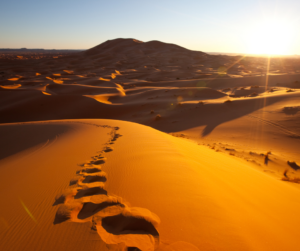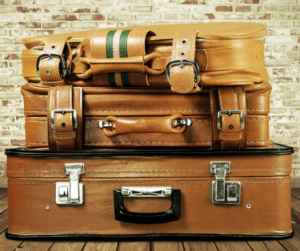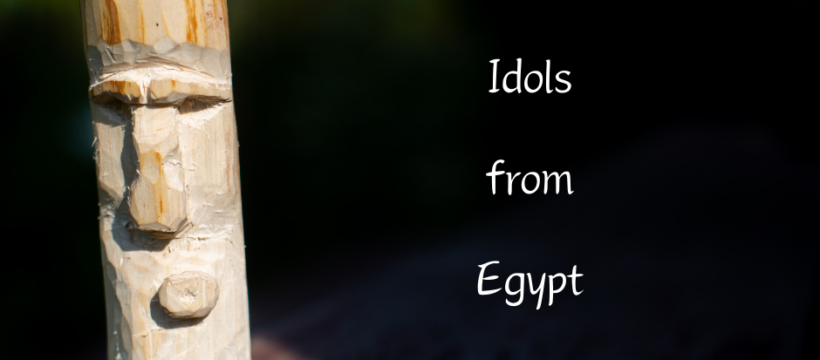The Israelite Egypt
What began as Joseph inviting his brothers and their families to move to Egypt during the famine, turned into the Israelites being enslaved many years later. They lived among the Egyptians, but soon became too numerous, and the Pharaoh placed them in slavery. According to scripture (Genesis 15:13, Exodus 12:40-41) they remained in slavery around four hundred years.
Exodus 1:13-14 (CSB) says, “They worked the Israelites ruthlessly and made their lives difficult with labor in brick and mortar and in all kinds of fieldwork. They ruthlessly imposed all this work on them.”
Their enslavement brought them to their breaking point. They couldn’t take the bondage anymore. The harsh way of life became too much. As they hit rock bottom, they cried out to God, and he heard them (Exodus 3:7-8).
Our Egypt
And we have our own Egypts don’t we? Whether it’s the abuse suffered our family of origin or events that happened outside our control. Or maybe our Egypt happened because of choices to chase the wrong directions or live a life of pleasure instead of following Christ. No matter how we ended up in Egypt, it’s a place where we remained captive and enslaved. We became accustomed to the harsh way of life, but after some time, the bondage grew too great.
We couldn’t take the pain. The chains. The suffering. As we hit rock bottom, we cried out to God. And he heard us, just like he heard the Israelites.
The Israelite Wilderness
When they cried out to God, he sent Moses, the deliverer. Moses went before Pharaoh time after time, asking him to let the people go. Finally, after ten plagues which tortured the Egyptians, Pharaoh relented and allowed the Israelites to leave.
 They left captivity and entered the wilderness, in hope of eventually reaching the Promised Land. While in the wilderness, they faced hardships and each time, God rescued them. He parted the Red Sea and they walked across on dry ground. They needed water to drink, and he brought it from a rock. The sandals on their feet never wore out, even after forty years. God also made provisions for them by sending manna daily to eat each day on their journey.
They left captivity and entered the wilderness, in hope of eventually reaching the Promised Land. While in the wilderness, they faced hardships and each time, God rescued them. He parted the Red Sea and they walked across on dry ground. They needed water to drink, and he brought it from a rock. The sandals on their feet never wore out, even after forty years. God also made provisions for them by sending manna daily to eat each day on their journey.
Everything in the wilderness was new and they had to learn to depend on this God they had called on for help. Change wasn’t easy. New levels of trust had to be created. Old ways had to be left behind. But the wilderness was essential for them to come to know and trust this God of the Promised Land.
Our Wilderness
When we cry out to God, he hears us too. So often he gets our attention through the words of a friend, the confrontation of a family member, or a situation that leaves us in over our head. He offers us a way out of our captivity and leads us into a season of change—as long as we choose to leave.
We eventually muster the strength to leave captivity and we enter our own wilderness season, in hope of reaching the freedom of our own Promised Land. While in our wilderness, we face hardships and trials. Maybe it’s temptation, or seduction. It may even be sickness or loss. One thing for sure, when we choose to leave our captivity, tough times come, and we have to choose what we will do. But God always offers a way of escape.
Everything in our wilderness is new and we must learn to depend on God in ways that we have always depended on ourselves and others. Changing our lives isn’t easy. New levels of trust have to be created and old ways must be left behind. But this wilderness experience is essential for us to come to know the God who is leading us into the Promised Land of total freedom from our past captivity.
Israel’s Baggage
Even though God proved himself faithful to his people again and again, the Israelites continued to turn away while in the wilderness. They had only known the religion of the Egyptians; even though enslaved, the belief and practices were familiar. Comfortable. Second nature.
The Psalmist mentions the division of their hearts in Psalm 106. “They aligned themselves with Baal-Peor and ate sacrifices offered to lifeless gods (vs 28).” “At Horeb they made a calf and worshipped the cast metal image (vs19).”
Though free from captivity, they brought their idols with them. False gods and false theology. Wrong hearts and deceived minds. Even in the face of all the miracles—they still brought baggage with them out of Egypt.
Our Baggage
Aren’t we the same? God proves himself faithful to us over and over and yet we continue to turn away and remain distracted by the things of this world. He saved us from our chains, yet we grumble and complain. Our problem seems to be the same as theirs—we’ve only known the captive’s way of life. Enslaved. Familiar. Comfortable.
 And even though we are set free from the old life, we bring our old idols with us. While the Israelite idols were made of metal or wood, our idols and baggage are a little easier to hide or excuse away. Enabling. Codependency. Low self-esteem. People pleasing. Rejection. Lies. Hypocrisy. Anger. Fear. Insecurity. Comparison. Anxiety. Or maybe our idols aren’t negative, but instead they look more like family, job, roles, and relationships.
And even though we are set free from the old life, we bring our old idols with us. While the Israelite idols were made of metal or wood, our idols and baggage are a little easier to hide or excuse away. Enabling. Codependency. Low self-esteem. People pleasing. Rejection. Lies. Hypocrisy. Anger. Fear. Insecurity. Comparison. Anxiety. Or maybe our idols aren’t negative, but instead they look more like family, job, roles, and relationships.
Baggage in the Promised Land
Though given strict instructions to leave their idol worship behind and not to partake of the religion of the people in the Promised Land, the Israelites did not listen. They carried their baggage from captivity into their new life of freedom. As a result, they weren’t very free.
They could not enjoy the life of freedom because they were still weighed down by the practices of their old life.
Baggage in Our Promised Land
We are the same. God tells us through Paul in 2 Corinthians 5:17 (CSB) “Therefore, if anyone is in Christ, he is a new creation; the old has passed away and see the new has come!” We are no longer who we once were. A common saying in recovery is, “Everything changes or nothing changes”.
So often, we leave our lives of captivity, learn to trust God through the wilderness, yet when we start walking in freedom with the Lord, we don’t realize we’ve carried our baggage from captivity into our new lives of freedom. When we do this, we aren’t truly free.
We can’t enjoy our lives of freedom when we are weighed down by the practices of our old life.
Leaving Our Idols Behind
The new year is quickly approaching. Do we have any idols from years before that we need to leave behind? Are we living a life in Christ, but struggling to make any forward momentum? Maybe we’ve brought baggage from our past captivity with us into this life of newness. And maybe that baggage needs to no longer be excused, justified, or allowed.
 If we’re stuck or aren’t growing, we must examine our heart and ask God to show us what old patterns, thoughts, lies, and habits still have root in our life. Once those areas are exposed we leave that baggage behind and learn what it means to walk in total freedom, without modifications, justifications, allocations, or accommodations. Being free means freedom from all those old ways and old idols. All things new.
If we’re stuck or aren’t growing, we must examine our heart and ask God to show us what old patterns, thoughts, lies, and habits still have root in our life. Once those areas are exposed we leave that baggage behind and learn what it means to walk in total freedom, without modifications, justifications, allocations, or accommodations. Being free means freedom from all those old ways and old idols. All things new.
What idols do you need to leave in Egypt?
(for more on being new in Christ, read this post by Martin Wiles: Putting on the New)
Copyright Christy Bass Adams, December 2023, all images from Canva




Great reminders for those of us who have slid away from self-examination. a good time for fresh starts.
Blessings on your new year, Christy.
Insightful and thought-provoking! Thank you, Christy!
Excellent thought provoking challenge for self and divine assessment as we enter 2024.
Happy New Year, Christy. God bless!